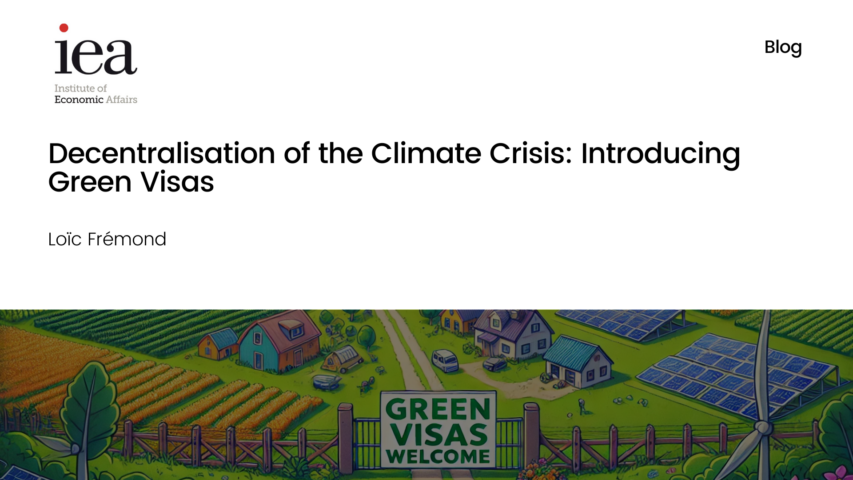Decentralisation of the Climate Crisis: Introducing Green Visas

Decentralisation of the Climate Crisis: Introducing Green Visas
Loïc Frémond // 4 February 2020
Neoliberals often criticise governments for overly centralising the decision-making process. They argue that this makes it difficult for individual actors to intervene, who may possess useful local information, thanks to their specialised skills and knowledge. In the European Union, the political landscape has become increasingly paternalistic. This is equally true of governments on the national level. Indeed, Eurosceptics frequently criticise centralised political structures in Brussels; yet these very critics often ignore the same issue in their home countries. If centralisation is bad for the EU, surely it is also bad for the individual member state.
One of the issues most impacted by political centralisation is climate change. Government institutions are necessarily in a worse position to try to protect the environment than local actors in possession of more specialised knowledge and the ability to assess needs. To put it succinctly, centralisation comes at the cost of information.
There are arguments to be made in favour of centralisation. In theory, centralisation yields efficient policy outcomes by standardising the approach, preventing a race to the bottom. Thus, improved efficiency would arise because external effects make uncoordinated policies inefficient, lacking in both scale and scope. And centralisation is correct in valuing efficiency as a desired policy outcome. In fact, we don’t even need to get rid of centralisation altogether; a global specialist on air quality is better utilised advising the European Commission than a local council.
However, if we really want to pursue maximum efficiency, then we should increase migration. Specifically, we should focus on increasing migration from countries most affected by climate change, by introducing a programme of “Green Visas”.
Through this programme, we would enable those who wish to either dedicate themselves to climate change research or seek employment in green industries to migrate to the European Union. In so doing, we would recruit those with the most specialised local knowledge to contribute to current efforts to combat climate change. The advantages of this scheme would be twofold. In the short term, this would reinforce the EU’s reputation as a cutting-edge centre for climate science research and as an incubator for eco-friendly innovation. In the long term, it could provide a viable means for sustainable development for growing economies, curbing future migration trends and potentially avoiding the migrant crisis that nationalists warn of.
This is not an entirely new idea. In 2019, Portugal extended its pre-existing residency program for wealthy foreigners, the Golden Visa, handing out visas to foreign investors by investing €500,000 or more in environmental development projects such as organic agriculture, ecotourism or renewable energies. Nor is it the only country in the European Union to do this – Spain, Malta, Greece, and Cyprus all have similar programmes. And the scheme has proven to be massively popular, especially with investors from China, South Africa, Turkey, and China.
The addition of this new visa-residency category was an attempt by the Portuguese government to support its goal of achieving carbon neutrality by the year 2050. But it’s more than this. Portugal has recognised that the solution to climate change is not to be found in the authoritarian measures championed by the likes of Greta Thunberg, but in green capitalism. What’s more, it has been a total success. By providing a new channel for Foreign Direct Investment into their country, they have ensured a booming new growth sector in eco-friendly products and services and made a sizeable effort in de-carbonising their economy.
However, although this is a good start, it does not go far enough. Whilst the policy has been successful, it could equally be viewed as a way for the ultra-rich to buy their way into obtaining residency in a European Country.
The European Parliament should adopt this scheme and adapt it to allow a wider scope of individuals to come and participate in our growing green economy, regardless of wealth. If they did so, we could ensure that we made the most of their diverse skill sets and specialised knowledge to create the best possible environment to surmount the current climate challenges.
EPICENTER publications and contributions from our member think tanks are designed to promote the discussion of economic issues and the role of markets in solving economic and social problems. As with all EPICENTER publications, the views expressed here are those of the author and not EPICENTER or its member think tanks (which have no corporate view).



